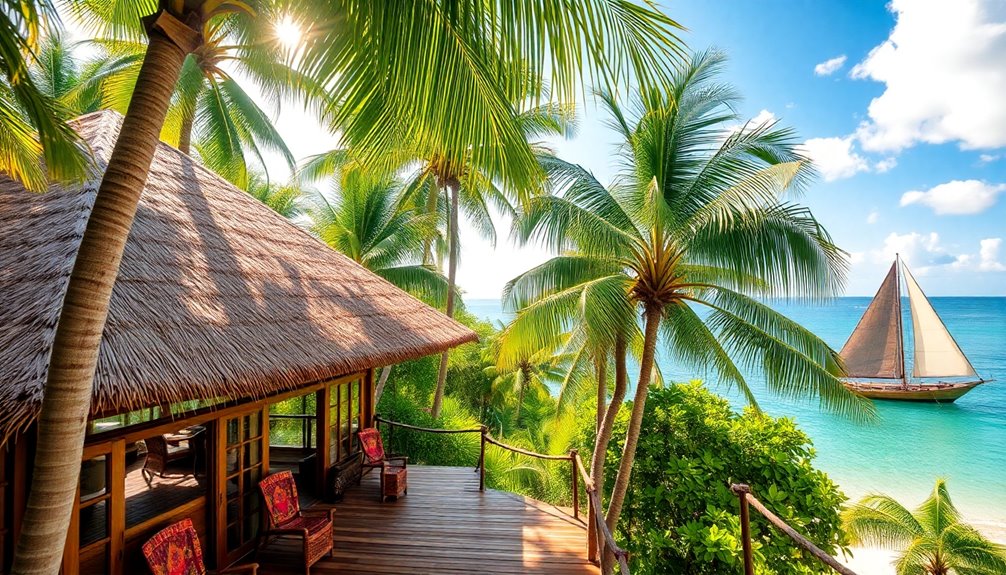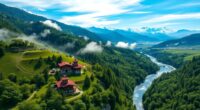Zanzibar's eco-lodges merge local culture with sustainability, offering you a chance to connect with both nature and the community. These lodges use renewable energy and source food locally, reducing their carbon footprints. Engage in authentic experiences like spice tours while supporting local artisans at vibrant markets. From guided wildlife tours in protected areas to community-led reforestation projects, your visit contributes to conservation and local economies. Plus, the rainy season revitalizes landscapes, making them ideal for exploration. Discover how you can enhance your stay and make a positive impact on this enchanting island.
Key Takeaways
- Eco-lodges in Zanzibar utilize renewable energy and local food sourcing to minimize environmental impact and enhance sustainability.
- Wildlife tours offered by these lodges promote responsible viewing and support local fishing communities through cultural experiences.
- Community empowerment initiatives at eco-lodges contribute to local economies and conservation efforts, fostering a sustainable tourism model.
- Local artisan workshops and markets allow travelers to engage with Zanzibar's rich cultural heritage while supporting traditional craftsmanship.
- Sustainable practices at eco-lodges, including reforestation projects and marine conservation, enhance biodiversity and protect unique species like the Zanzibar red colobus monkey.
Introduction
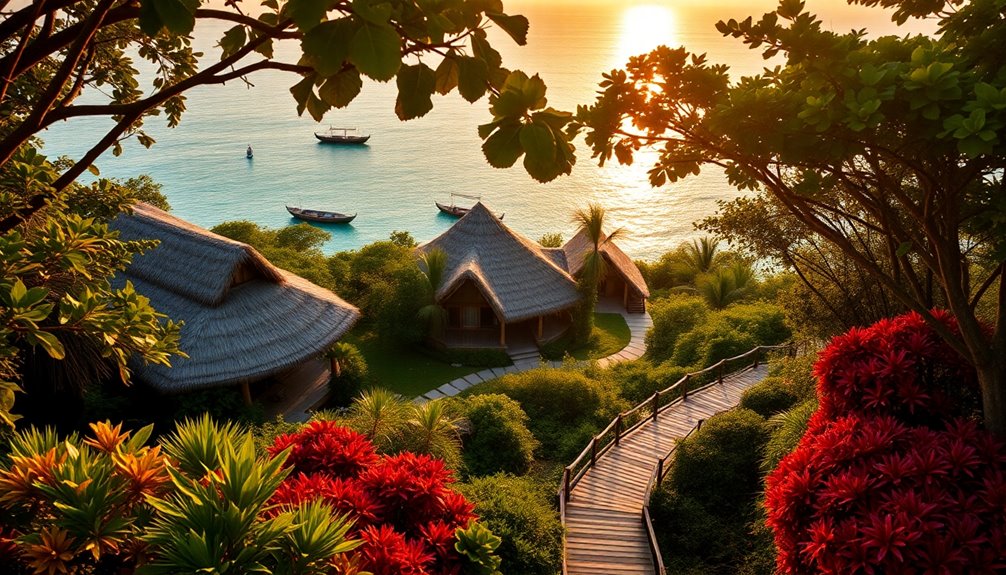
When you think of Zanzibar, pristine beaches and vibrant coral reefs likely come to mind.
Eco-lodges here not only offer luxurious stays but also play a crucial role in preserving the island's unique biodiversity.
Pristine Beaches and Coral Reefs
Zanzibar's stunning beaches and vibrant coral reefs invite you to explore an underwater paradise that feels almost untouched.
With pristine beaches like Nungwi and Kendwa, you'll find soft white sands and crystal-clear waters perfect for relaxation and adventure.
The surrounding coral reefs, especially at Mnemba Atoll, boast over 450 fish species, making it a snorkeling haven.
Visiting Chumbe Island Coral Park showcases how eco-tourism supports marine conservation efforts, protecting this vibrant ecosystem.
Eco-lodges prioritize sustainable practices, ensuring minimal ecological impact while promoting environmental education among visitors.
As you dive into this experience, you'll not only witness natural beauty but also contribute to preserving Zanzibar's unique marine environment for future generations.
Preserving Zanzibar's Unique Biodiversity
As you explore the enchanting landscapes of Zanzibar, you'll discover a rich tapestry of ecosystems that play a crucial role in supporting the island's unique biodiversity. The Zanzibar red colobus monkey, an endangered species, serves as a vital indicator of the island's health, prompting conservation efforts to protect its habitat.
Eco-lodges prioritize sustainable practices, utilizing renewable energy and minimizing water usage to safeguard local flora and fauna. Additionally, marine protected areas, like Chumbe Island Coral Park, enhance biodiversity by preserving coral reefs and marine life.
Community-based tourism initiatives engage locals in these conservation efforts, ensuring that preserving Zanzibar's biodiversity not only benefits the environment but also provides economic advantages to residents. Together, these efforts create a harmonious balance between culture and sustainability.
Travel From Nairobi to Zanzibar
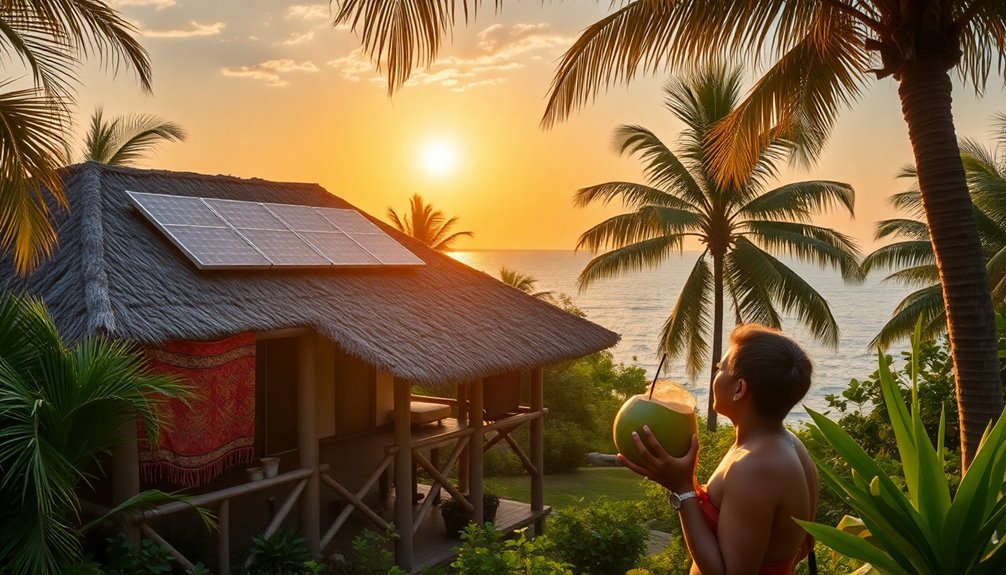
When you're planning your trip from Nairobi to Zanzibar, you've got a few options.
You can catch a quick flight that takes just 1.5 to 2 hours, or choose a more adventurous route involving a bus or train to Mombasa and a ferry ride over.
Whichever way you travel, you'll soon find yourself in a paradise rich with culture and eco-friendly experiences.
Flights From New York City
Wondering how to get from New York City to the beautiful eco-lodges of Zanzibar?
You'll find that flights from New York City typically require at least one layover, often in hubs like Amsterdam, Doha, or Nairobi. Major airlines like Kenya Airways and Qatar Airways cater to eco-conscious travelers interested in eco-tourism.
Expect travel times to range from 18 to 25 hours, with round-trip fares between $800 and $1,500.
Upon arrival at Abeid Amani Karume International Airport, you'll be ready to immerse yourself in sustainable safari adventures and engage with local communities.
Just remember to check visa requirements and health regulations before your trip, ensuring a smooth journey that minimizes your environmental impact while exploring Zanzibar's rich cultural experiences.
Flights From London to Zanzibar
If you're planning a trip from London to the stunning eco-lodges of Zanzibar, you'll find plenty of flight options with convenient one-stop connections. Most flights from London to Zanzibar usually connect in major cities like Nairobi, Doha, or Addis Ababa.
Here are key details to consider:
- Average flight duration: Expect 13 to 20 hours, depending on layovers.
- Nairobi transit: Direct flights from Nairobi to Zanzibar take about 2 hours.
- Visa requirements: UK passport holders need a visa, obtainable on arrival or online.
- Competitive fares: Prices often start around £400, varying by season and airline.
Get ready to explore Zanzibar's local culture and embrace sustainability at its eco-lodges!
Flights From Sydney to Zanzibar
Traveling from Sydney to Zanzibar typically involves at least one layover, often through major hubs like Dubai or Nairobi before you arrive at Abeid Amani Karume International Airport.
The total travel time averages between 20 to 30 hours, depending on your layover durations. If you find yourself in Nairobi, you're in luck—direct flights to Zanzibar take just about 1.5 hours.
Airlines like Kenya Airways and Ethiopian Airlines frequently operate these routes, providing competitive pricing and schedules.
To get the best deals, it's smart to book flights in advance and keep an eye on seasonal price fluctuations, as ticket costs can vary significantly based on demand and the time of year.
Enjoy your journey!
Bicycle Rentals for Eco-Travel
As you plan your eco-friendly adventure from Nairobi to Zanzibar, consider the benefits of renting a bicycle upon arrival.
Bicycle rentals provide an excellent way to explore the island while supporting sustainable tourism and minimizing your carbon footprint.
Here are four reasons to choose biking:
- Access to Cultural Sites: Cycle to historic Stone Town and spice plantations.
- Natural Beauty: Enjoy scenic coastal paths and lush forests up close.
- Support Local Communities: Renting bikes helps boost local economies.
- Guided Cycling Tours: Join tours for a deeper understanding of Zanzibar's rich heritage and environmental conservation efforts. Additionally, engaging in eco-friendly excursions promotes responsible tourism practices that align with sustainability goals.
Eco-Conscious Wildlife Tours
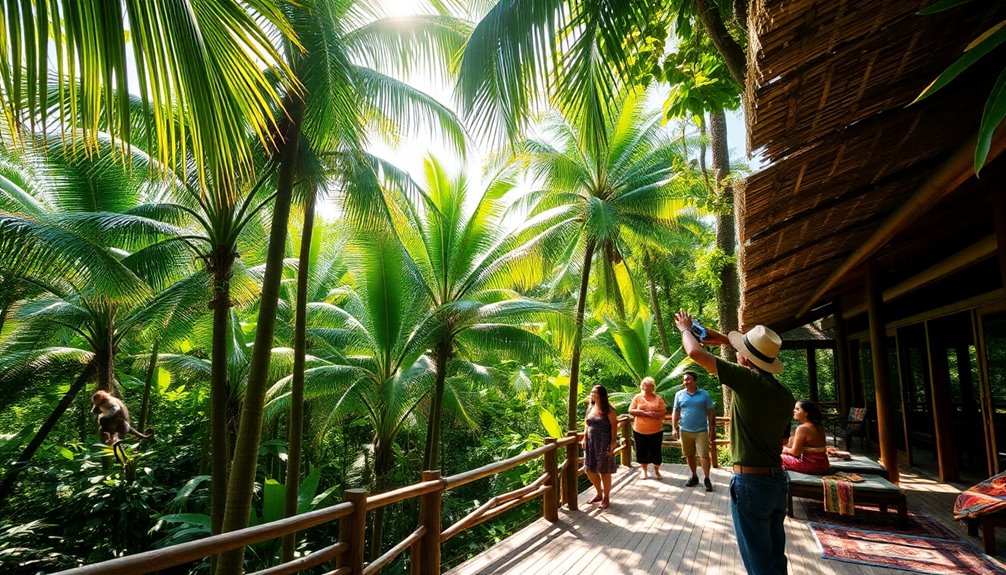
When you explore Zanzibar, eco-conscious wildlife tours offer a chance to connect with nature responsibly.
Guided nature walks and sustainable snorkeling excursions not only showcase the beauty of the island but also promote conservation efforts.
Staying at sustainable beachfront lodgings enhances your experience while supporting local communities and protecting the environment.
Guided Nature Walks and Safaris
Exploring Zanzibar's stunning landscapes through guided nature walks and eco-conscious wildlife tours offers a unique way to connect with the island's rich biodiversity.
You'll immerse yourself in the natural beauty while learning from local guides about crucial conservation efforts. Here are some highlights of these experiences:
- Spot the endangered Zanzibar red colobus monkeys in their natural habitat at Jozani Forest Reserve.
- Participate in walking safaris offered by eco-lodges, revealing diverse ecosystems.
- Enjoy community-based tourism initiatives that support local communities and conservation.
- Gain insights into native flora and fauna, promoting awareness of environmental issues.
These guided nature walks not only enhance your understanding of biodiversity but also contribute to sustainable practices on the island.
Sustainable Snorkeling Excursions
After soaking in the vibrant landscapes and wildlife of Zanzibar through guided nature walks, you can take your adventure underwater with sustainable snorkeling excursions.
These eco-conscious tours prioritize sustainable snorkeling by emphasizing responsible wildlife viewing while exploring the stunning coral reefs and diverse marine biodiversity. Many excursions operate in Marine Protected Areas like Chumbe Island Coral Park, where conservation efforts thrive through no-take fishing zones.
Local guides trained in marine conservation lead the way, incorporating educational components that teach you about the importance of coral ecosystems. By participating, you're not just enjoying the underwater beauty; you're also supporting community initiatives, as a portion of your tour fee often contributes to local conservation and environmental education programs.
Sustainable Beachfront Lodgings
While enjoying the breathtaking coastal views of Zanzibar, you'll find that sustainable beachfront lodgings not only offer relaxation but also a commitment to environmental stewardship.
These eco-conscious retreats prioritize:
- Renewable Energy: Powering facilities with solar and wind sources.
- Local Sourcing: Reducing the carbon footprint by using locally grown food.
- Wildlife Tours: Engaging in responsible wildlife viewing and marine conservation education.
- Community Empowerment: Supporting local fishing communities through cultural experiences like spice tours.
Support Local Artisans and Markets
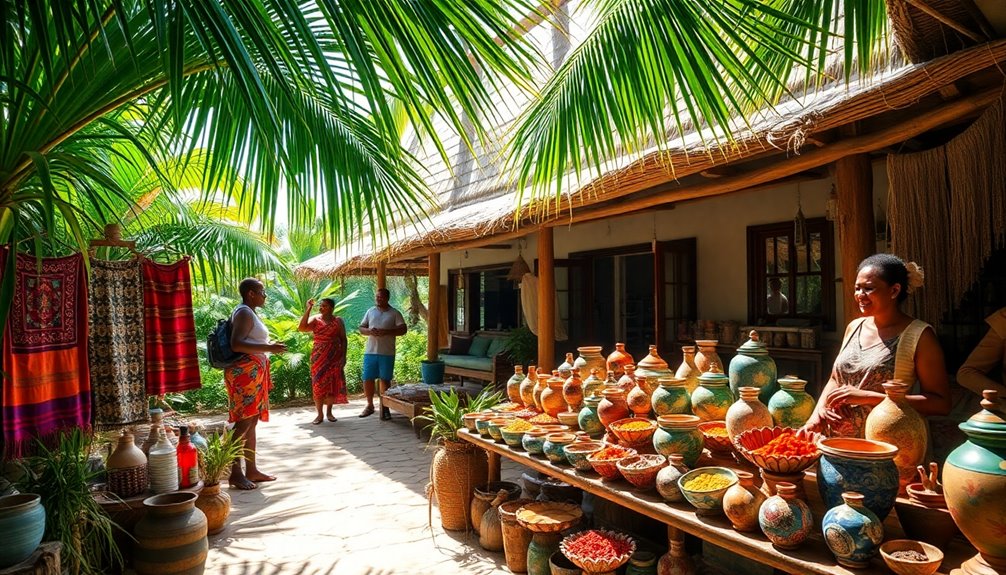
When you support local artisans in Zanzibar, you're not just buying a souvenir; you're helping preserve traditional crafts that embody the island's rich cultural heritage.
By visiting markets like Darajani Market, you can purchase locally sourced goods and directly support local artisans, creating job opportunities and boosting the economy.
Many eco-lodges showcase these handcrafted items in their decor, promoting sustainable tourism by reducing reliance on imports.
Engaging in workshops connects you to artisans, enhancing your experience while empowering communities through education and income.
Every handcrafted item you buy sustains traditional art forms and contributes to responsible tourism, ensuring that these cultural treasures thrive for future generations.
Your support truly makes a difference in Zanzibar's vibrant artisan community.
Community-led Reforestation Projects
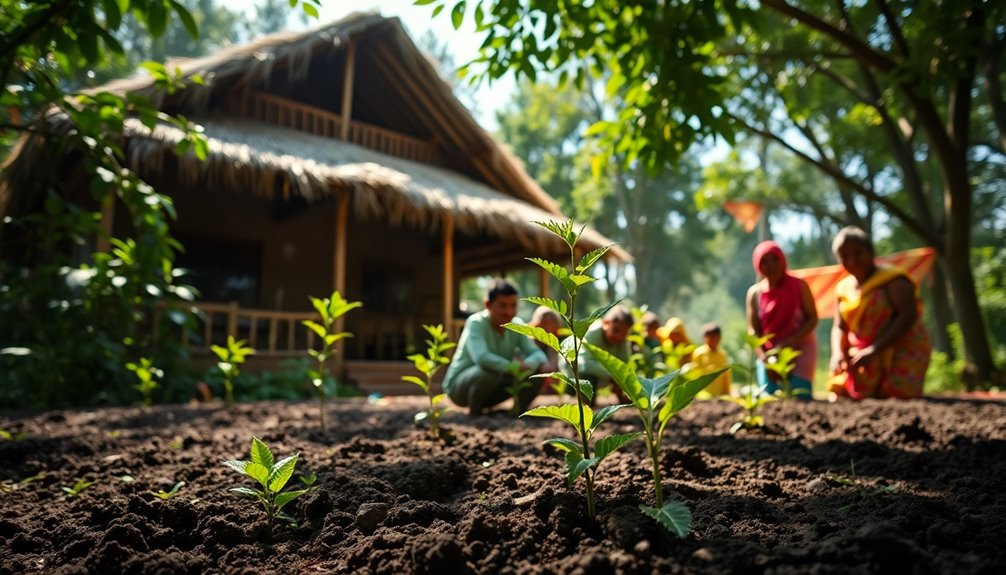
In Zanzibar, community-led reforestation projects are making a big impact, thanks to the collaboration between local communities, the government, and NGOs.
You're not just helping restore native forests; you're also fostering cultural sustainability and creating sustainable livelihoods.
Government and NGO Efforts
Community-led reforestation projects in Zanzibar play a vital role in restoring degraded landscapes and enhancing biodiversity. The government collaborates with NGOs to implement effective reforestation initiatives, focusing on mangrove forests that are essential for coastal protection.
Here's how these efforts benefit local communities:
- Tree Planting: Over 100,000 trees have been planted, aiding carbon sequestration.
- Training Programs: NGOs provide training in sustainable land management and ecological restoration.
- Resource Provision: Reforestation supports livelihoods by offering fruit and timber.
- Eco-Tourism Promotion: Healthy ecosystems attract eco-tourism, enhancing local economies.
Community and Cultural Sustainability
The efforts to restore Zanzibar's ecosystems are deeply intertwined with community and cultural sustainability, particularly through initiatives that engage local residents in reforestation projects. These community-led initiatives enhance biodiversity and mitigate climate change, with eco-lodges and local NGOs collaborating with residents. Schools participate in environmental awareness programs, emphasizing the importance of preserving natural resources. Additionally, understanding personal debt forgiveness bills can empower eco-lodge partnerships to provide financial education to local communities.
| Benefits | Community Involvement | Eco-Lodge Partnerships |
|---|---|---|
| Improved soil health | Local planting events | Educational workshops |
| Enhanced food security | Training in sustainable harvesting | Ecotourism promotion |
| Increased biodiversity | Youth engagement | Financial support |
| Climate resilience | Cultural preservation | Community ownership |
| Economic opportunities | Active participation | Long-term sustainability |
Together, these efforts contribute to a thriving environment for future generations.
Rainy Season for Lush Landscapes
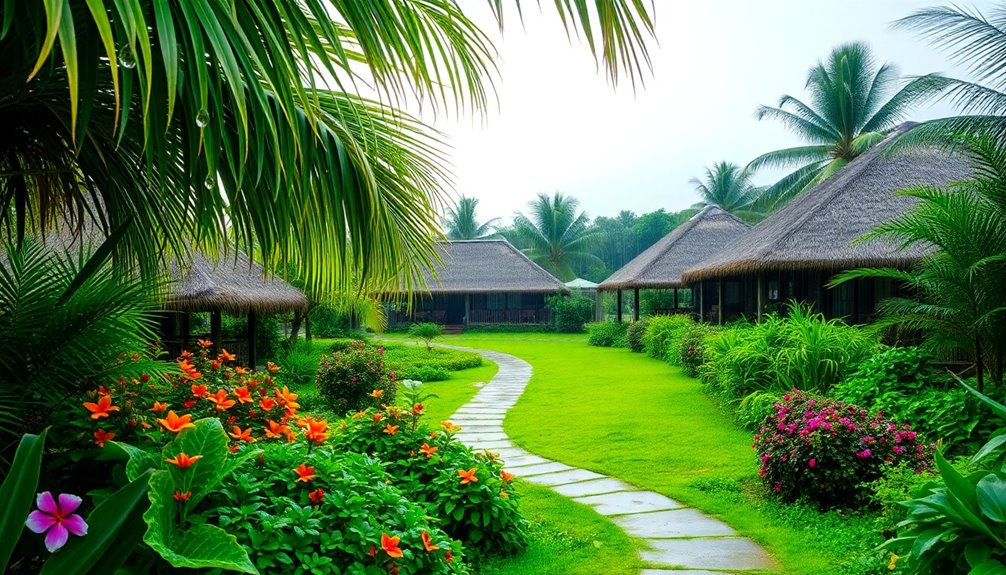
When you visit Zanzibar during the rainy season from March to May, you'll witness the island transform into a vibrant, lush paradise.
The humidity levels can be high, but the optimal weather creates perfect conditions for exploring its rich biodiversity.
Embrace the refreshing rains, as they rejuvenate both the landscape and your eco-travel experience.
Optimal Weather for Eco-Travel
Zanzibar's rainy season, spanning from March to May, transforms the island into a lush paradise that beckons eco-travelers. This period is perfect for experiencing the beauty of nature while supporting sustainable practices.
Here are four reasons to visit during this time:
- Biodiversity: Witness the flourishing local ecosystems revitalized by up to 200mm of rainfall.
- Nature Exploration: Enjoy cooler temperatures for hikes and wildlife spotting.
- Birdwatching: Observe migratory species arriving, creating a vibrant spectacle.
- Eco-Lodges: Many offer special packages, enhancing your cultural experience while encouraging eco-tourism.
Embrace the rainy season for a unique and enriching adventure in Zanzibar, where every moment connects you to its stunning landscapes and diverse wildlife.
Humidity Levels Affect Comfort
Although the rainy season brings stunning landscapes to life, humidity levels can soar above 85%, making comfort a challenge for some travelers.
In Zanzibar, the combination of high humidity and average temperatures of 28°C (82°F) enhances the growth of tropical flora, creating vibrant scenery. Eco-lodges here embrace sustainability by incorporating comfortable designs and natural ventilation, helping you cope with the humidity while enjoying the lush surroundings.
Rainfall typically occurs in short bursts, providing a refreshing pause from the heat and contributing to the region's rich biodiversity.
If you visit during this season from March to May, prepare for occasional heavy rains but also witness the beauty that this humidity fosters in Zanzibar's landscapes.
How to Make Your Trip More Sustainable
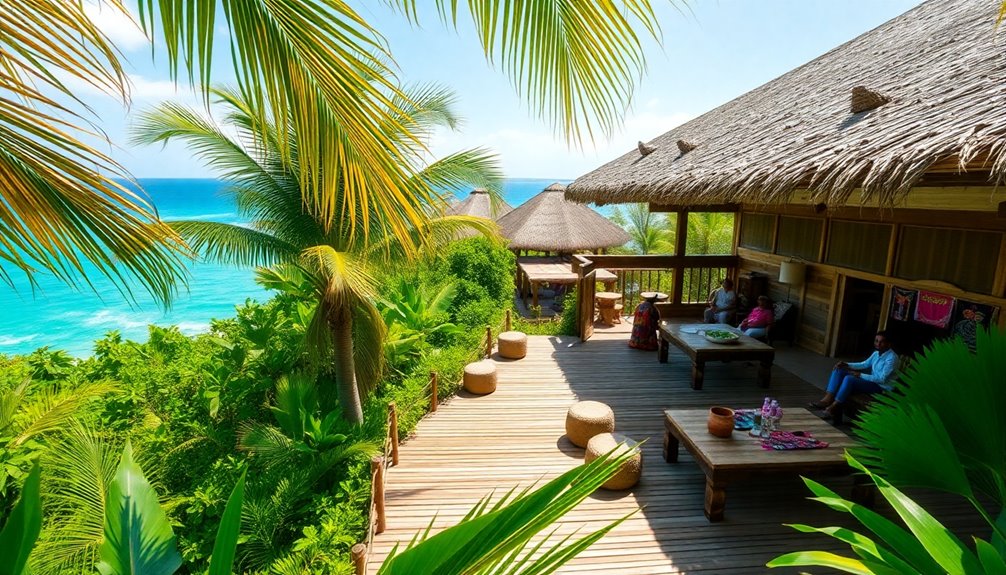
To make your trip more sustainable in Zanzibar, start by using biodegradable toiletries and containers, which help reduce waste.
You can also support local conservation initiatives that focus on protecting the island's unique ecosystems.
Biodegradable Toiletries and Containers
When you choose eco-lodges in Zanzibar, you're not just enjoying a beautiful getaway; you're also making a conscious effort to support sustainability.
By opting for biodegradable toiletries and containers, you contribute to reducing plastic waste and protecting the environment.
Here are four ways you can enhance your sustainable travel experience:
- Use biodegradable toiletries that break down naturally, minimizing pollution.
- Support local suppliers providing these products, fostering community engagement.
- Encourage eco-friendly practices in the hospitality industry by choosing eco-lodges.
- Embrace responsible tourism that aligns with the principles of eco-tourism, ensuring a minimal ecological footprint.
Support Local Conservation Initiatives
Choosing eco-lodges in Zanzibar not only enhances your travel experience but also opens up opportunities to support local conservation initiatives. By engaging in eco-friendly excursions, like guided tours at Chumbe Island Coral Park, you contribute to marine conservation efforts. Participating in local community projects, such as those at the Nungwi Turtle Sanctuary, helps rehabilitate endangered sea turtles.
Opt for responsible wildlife viewing to minimize habitat disturbance and support trained local guides. You can also purchase handmade crafts from artisans, bolstering the local economy and preserving cultural heritage. Additionally, you can learn about herbology practices that may include the use of local plants for sustainable living.
Here's a quick overview of ways to make your trip sustainable:
| Activity | Benefit | Location |
|---|---|---|
| Eco-friendly excursions | Supports marine conservation | Chumbe Island Coral Park |
| Local community projects | Aids endangered sea turtles | Nungwi Turtle Sanctuary |
| Responsible wildlife viewing | Minimizes habitat disturbance | Various eco-lodges |
| Purchasing handmade crafts | Boosts local economy | Artisan markets |
| Staying at eco-lodges | Promotes sustainability | Throughout Zanzibar |
Frequently Asked Questions
How Are Eco Lodges Sustainable?
Eco-lodges are sustainable because they focus on minimizing their environmental impact.
You'll find they use renewable energy sources like solar power, which cuts down on fossil fuel reliance. They practice water conservation through techniques such as rainwater harvesting.
Many eco-lodges source food locally, supporting nearby farmers while reducing transportation emissions. They also implement waste management strategies, like recycling and composting, and engage with local communities to promote economic empowerment and cultural preservation.
Conclusion
As you explore Zanzibar's eco-lodges, you'll find that every moment intertwines culture and sustainability. Who would've thought a simple stroll through a local market could lead to discovering hidden artisan gems? By supporting community-led projects, you're not just a traveler; you're part of a beautiful coincidence—where your adventure helps preserve the island's lush landscapes and vibrant culture. So, pack your bags, embrace the unexpected, and make your journey a sustainable one that resonates long after you leave.

